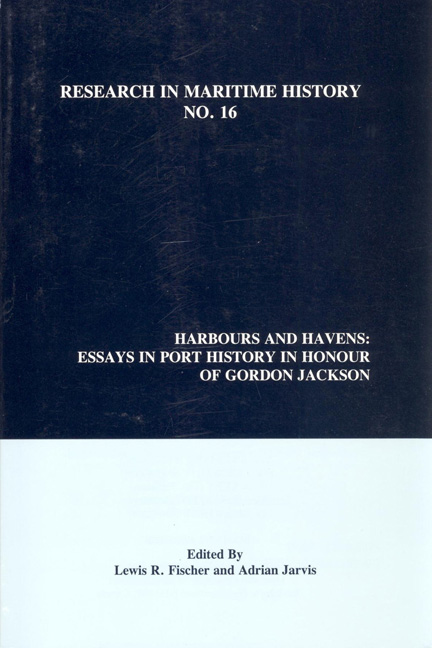Book contents
- Frontmatter
- Contents
- About the Editors
- Contributors
- Introduction
- “Gordon Jackson: An Appreciation”
- “Port History: Some Thoughts on Where it Came from and Where it Might be Going”
- “Port Politics: Interest, Faction and Port Management in Mid-Victorian Liverpool”
- “Our Little Company:' The Wilsons and North Eastern Railway Shipping Company Limited, 1906-1935”
- “The Changing Functions of a Rural Port: Dumfries, 1700-1850”
- “Australian Ports Since 1945”
- “Aspinall, Cornes and Company and the Early Development of the Port of Yokohama”
- “Dubai: From Creek to Global Port City”
- “New York's German Suburb: The Creation of the Port of Bremerhaven, 1827-1918”
- “Capital and Labour in the Port Town of Esbjerg, 1945- 1999”
- “Port Policies: Seaport Planning around the North Atlantic, 1850-1939”
- “Gordon Jackson: A Bibliography”
“Dubai: From Creek to Global Port City”
- Frontmatter
- Contents
- About the Editors
- Contributors
- Introduction
- “Gordon Jackson: An Appreciation”
- “Port History: Some Thoughts on Where it Came from and Where it Might be Going”
- “Port Politics: Interest, Faction and Port Management in Mid-Victorian Liverpool”
- “Our Little Company:' The Wilsons and North Eastern Railway Shipping Company Limited, 1906-1935”
- “The Changing Functions of a Rural Port: Dumfries, 1700-1850”
- “Australian Ports Since 1945”
- “Aspinall, Cornes and Company and the Early Development of the Port of Yokohama”
- “Dubai: From Creek to Global Port City”
- “New York's German Suburb: The Creation of the Port of Bremerhaven, 1827-1918”
- “Capital and Labour in the Port Town of Esbjerg, 1945- 1999”
- “Port Policies: Seaport Planning around the North Atlantic, 1850-1939”
- “Gordon Jackson: A Bibliography”
Summary
“[Dubai is] a cosmopolitan metropolis with excellent financial facilities.“
“In the final analysis a port is not a place, but a community of merchants.“
Introduction
Since 1969, when Rhoads Murphey published his seminal article “Traditionalism and Colonialism,” maritime and urban historians of ports and port cities have far transcended the temporal and locational boundaries of his nineteenth-century South and East Asian colonial ports. They have developed their subject in many directions and genres, including urban “biographies,” regional and comparative studies, and individual aspects of the functioning of ports. The study of specific economic and social groups within port cities is matched by that of external port systems, in which the fluctuating fortunes of places can be analysed in terms of inter-port rivalry and/or the interaction between maritime and terrestrial dynamics. From an international perspective, the most stimulating facet has been the realisation that there is nothing intrinsically European, western or even “modern” about ports and port cities, as the rapidly-growing historiography of maritime Asia demonstrates. Economic and technological conditions vary greatly by time and place but “brides of the sea,” as both Venice and Jiddah identified themselves, can be found in all places where sufficient trade and shipping exists to form a community with a critical economic and social mass.
The purpose of this essay is to contribute to this literature through a sketch of Dubai from its origins in the early nineteenth century as a tiny settlement at a creek on the northeastern coast of Arabia (the “pirate coast,” as previous European generations called it) to its current position as a prosperous (GNP per capita well over US$20,000) global port, port city and commercial centre.5 The analysis of Dubai's growth and development is based on the four dynamic and historically interactive factors that determine the fortunes of all port cities: site, situation, entrepreneurship (economic as well as political), and sense of identity. Site and situation are the bread and butter of transport geography, relating to local topography and the location of the port in relation to hinterland, foreland and strategic commercial and naval routes. Site and situation are always relative, depending on factors such as technology, production, consumption and local, regional or global political configurations.
- Type
- Chapter
- Information
- Harbours and HavensEssays In Port History In Honour Of Gordon Jackson, pp. 159 - 190Publisher: Liverpool University PressPrint publication year: 1998

